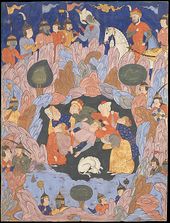Template:Pictorial-Islam-options: Difference between revisions
| [checked revision] | [checked revision] |
mNo edit summary |
mNo edit summary |
||
| Line 330: | Line 330: | ||
<option weight="1">{{Pictorial-Islam|1=Muhammad and History's 100 Most Influential People|2=[[File:The 100 A Ranking of the Most Influential Persons in History.jpg|150px|link=Muhammad and | <option weight="1">{{Pictorial-Islam|1=Muhammad and History's 100 Most Influential People|2=[[File:The 100 A Ranking of the Most Influential Persons in History.jpg|150px|link=Muhammad and Historys 100 Most Influential People]]|3=In 1978 Jewish American astrophysicist Michael H. Hart (born April 28, 1932) released a book titled "The 100: A Ranking of the Most Influential Persons in History". | ||
This book has been somewhat controversial, not least due to its placing of Muhammad (the founder of Islam) over Jesus Christ (the founder of Christianity). This has led to the list being used for the purpose of | This book has been somewhat controversial, not least due to its placing of Muhammad (the founder of Islam) over Jesus Christ (the founder of Christianity). This has led to the list being used for the purpose of propaganda. | ||
Hopefully any | Hopefully any apologist that reads this article will ponder the following; what exactly do they (as followers of Islam) consider so great about a Jewish-American racist “Islamophobe's” opinion that an individual who he refers to as a “conqueror” ranked alongside Adolf Hitler is temporarily the most influential (not 'greatest') person in human history? ([[Muhammad and Historys 100 Most Influential People|''read more'']])}}</option> | ||
Revision as of 22:50, 18 February 2014
Also see: Template:Pictorial-Islam
|
